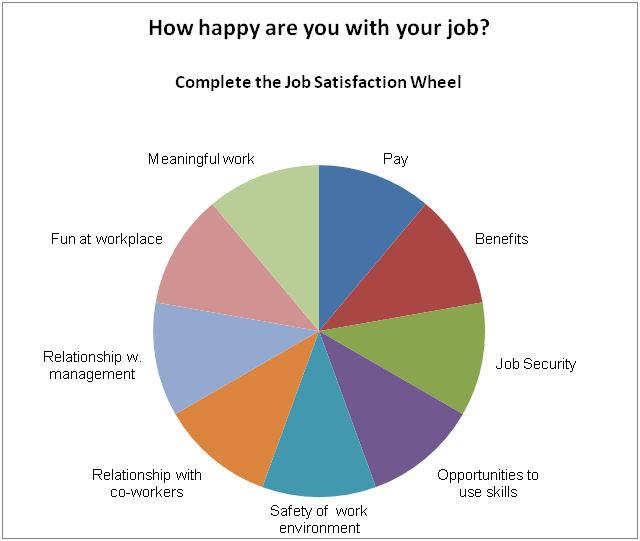Written on Tuesday, July 20th, 2010 at 8:14 pm by Christiane

The ten sections of the Job Satisfaction Wheel represent important factors, which for many people determine job satisfaction.
 Print the wheel. Seeing the center of the wheel as 0 and the outer edges as 10, assign each section a value between 0 and 10, depending on YOUR satisfaction with the particular factor at YOUR current workplace. If you connect these values with a straight or curved line to create a new outer edge, do you still have a nice, round wheel?
 If you see areas that need improvement, take action. Don’t accept a dissatisfying job situation! Call me at 781 777 2791 or email me to schedule a Free Coaching introduction session to find out how Career Coaching can help you.
 Read also my e-workbook “Learn to Love your Job” with information and activities designed to help you to find satisfaction in your job. Learn more about the book.

Tags: benefits, boss, career coach Christiane Turnheim, career coaching, coaching, coaching sessions, compensation, eWorkbook learn to love your job, fun at workplace, hate my boss, job satisfaction, job security, meaningful work, opportunities to use skills, pay, relationship with co-workers, relationship with management, safety of work environment, satisfaction factors, satisfaction wheel, supervisor
 Comments
Comments »
Written on Tuesday, July 13th, 2010 at 7:52 pm by Christiane
Currently, job satisfaction is down to a record low in the US. About 55 % of Americans are unhappy with their work, according to a recent survey by the Conference Board research group.
Are you unhappy, too?
This eWorkbook will help you to identify strategies to get a satisfying job. “Learn to Love your Job” is not just a book to read. You will get 2 in 1, an eBook and an eCourse. “Learn to Love your Job” combines information with questions and self-tests about your own experiences and attitudes. You will also learn more about strategies to improve your job situation.
After reading the eWorkbook and doing the exercises, you will have a better understanding of your needs and what you are expecting from a job – besides a good salary, of course. You will know what makes you happy at your workplace and what triggers unhappiness.
After reading the eWorkbook “Learn to Love your Job” you will be able to answer among others the following questions:
• What are the 5 most important job satisfaction factors?
• How important are good relationships with co-workers for me? Do I have a strong need for building relationships with co-workers and/or customers?
• Do I need challenges in my work more than pay and benefits?
• How important is work for me? Am I just working for the money?
• What bothers me most at my workplace? My supervisor, not receiving recognition, or the working environment….?
• How can I improve my relationship with my boss?
• What can I do to make my work more interesting?
As the last two questions demonstrate, you will also learn how to change and improve the problem areas at your workplace so that you can finally say:
 I Love my job!
Chapter Overview:
1) What exactly is job satisfaction?
2) Why does job satisfaction matter? – Your health and job satisfaction. Test yourself: How satisfied are you at your current workplace?
3) Why are you working? Learn to distinguish between motivation and satisfaction!
4) What gets you out of the bed and to work every morning? Is it just the money? Or are you someone who needs challenges? How important are achievements and making a difference? Do you need interactions with other people? Read what famous psychologists say about motivation. (Herzberg, Maslow, Discrepancy theory, McClelland)
5) Role of key elements: Leadership and leadership styles, co-workers, salary and benefits. Take a test to determine your job happiness triggers! Discover also what you dislike most about your job.
6) How to get your dream job? Strategies to improve your current workplace.
7) Make an Action Plan, and start moving toward your Dream Job.
Don’t spend one more day in a dissatisfying job!     Â
Would you like to know more about the eWorkbook “Learn to Love your Job”? Call me at 781 777 2791 or email me.
Tags: achievement, benefits, career coach, career coaching, co-workers, coaching, conflict with co-worker, discrepancy theory, dislike co-workers, hate my co-workers, Herzberg, job satisfaction, key factors, leadership, leadership style, life coach, life coaching, Maslow, McClelland, motivation, pay, promotion, salary, unhappy with boss
 1 Comment
1 Comment »
Written on Wednesday, June 16th, 2010 at 4:20 pm by Christiane
What are the key factors that keep people happy in the workplace?
One would assume that this should be an easy question to research, however studies about this topic yield different results. For one, researchers use different questions in their surveys. Another reason is that not all studies analyze the results by age groups. Generally, younger workers tend to be less satisfied with their jobs than older workers and they do have different expectations.
The Society for Human Resource Management (SHRM) annually surveys employees and HR professionals about job satisfaction.
The Top 5 Job Satisfaction Factors for Employees are according to the 2009 Survey report :
- Job Security
- Benefits
- Compensation/Pay
- Opportunities to use skills and abilities
- Feeling safe in the work environment
The HR professionals in this study agreed with ‘ Job Security’ as top priority, and they also included ‘Benefit’s and ‘Opportunities to use skills and abilities’ among the top 5 factors. However, on rank 2 they put ‘Relationship with immediate supervisor’ and on rank 4’Ccommunication between employees and senior managemen’t.
Salary.com Inc.  found that employers overestimate the job satisfaction levels of their employees. According to the 2008/2009 Employee Satisfaction and Retention Survey by salary.com, about 65 % of employees said that they are somewhat satisfied with their jobs. Employers believed this number to be 77%. Â
Key Factors for staying in the job are according to the study:Â
Good relationships with co-workers, job security, desirable commute and desirable hours.  Good relationships with managers and adequate benefitswhere this time not among the top reasons why people remain in their jobs.
Top reasons to leave a job are according to the survey inadequate pay, insufficient recognition and not  enough development opportunities.
In my college classes, I usually give my students also a questionnaire about important job satisfaction factors. Most of my students are in their 20s, which means they belong to the group of the most unhappy workers in the US – at least according to the results of most  major surveys.
The top 5 key factors for job satisfaction according to my students are:
- Pay
- Benefits
- Relationship with supervisor
- Relationship with co-workers                             and, normally not included in surveys
- Humor/ having fun at the workplace
Perhaps this is the difference between todays young people and the rest of us workers. Young people want to enjoy the time they spend at work, while previous generations are more achievement oriented or only work to make a living.
Why do you work? What are the most important key factors for you? What motivates you? What can you do to improve a dissatisfying job?
Find the answers in my new eWorkbook: Job Satisfaction – Learn to Love Your Job!

This is not just another book to read. Activities like thought questions, questionnaires and exercises will guide you to a better understanding of your wishes and needs at the workplace. You will learn which aspects of your job are gratifying and which aspects need improvement. I also offer you advice and tips what you can do to improve your job situation.
Get the eWorkbook  “Job Satisfaction – Learn to Love Your Job” NOW!
Tags: benefits, career, career management, co-workers, commute, create job satisfaction, job satisfaction, job security, key factors for job satisfaction, opportunities to growth, opportunity to develop, pay, recognition, relationship with management, relationships with co-workers, salary
 7 Comments
7 Comments »
Written on Saturday, February 23rd, 2008 at 4:11 pm by Christiane
Money, money, money – that’s all what counts with respect to job satisfaction. Are you sure? Think again.
My students in my Psychology in Business and Industry class at the college, where I’m teaching believed like many other people at first that money is the main motivator that accounts for their job satisfaction. A few minutes later they had proven themselves wrong.
I had asked what makes a job satisfying, and they quickly came up with many aspects, not only pay: The environment, clean facilities, good benefits, competent bosses, nice coworkers, and flex-time, to name a few. Then I asked to rank those points, and “pay’’ easily won the top spot. Some objected and were saying, they wouldn’t take any job just because of a high salary. The majority, however, stayed with their assessment: As long as the job is “halfway decent”, a good pay would make the difference between job-happiness and job-frustration.
My next question was about the reasons, why they had been unhappy in previous jobs and quit. Surprisingly, it turned out almost nobody had ever quit about money. Reasons have been a boss, who was micro-managing, not enough appreciation or recognition of hard work, issues with co-workers, malfunctioning equipment and safety concerns, boring work or not getting to do the work they have been hired for. They had quit because they have been either unhappy with the work environment and the climate at the workplace or with the work itself.
In the end, they all agreed that there are apparently more important factors for job satisfaction than money. For some, the job fulfills their need for communication and relationships with other people. Consequently, nice bosses and co-workers are most important factors. Â Others love challenges and opportunities to grow. Therefore, they feel happier in jobs that offer responsibilities, independence, control over the work, and stimulation.
Obviously, People have different needs. Since most of us spend more time at work than with family and friends, it’s all the more important to clarify the own needs. A Life Coach will not only help you with this; a Life Coach will also assist you in finding the perfect job for you that fits to your needs. Read: What will I get from coaching?
Here is an exercise that gives an idea, how a life coach may work with you:
Think of a job that you liked and of one, where you quit because you couldn’t stand it there. Why was the first a good job and the second a bad job?
 3 Comments
3 Comments »



 Comments
Comments 